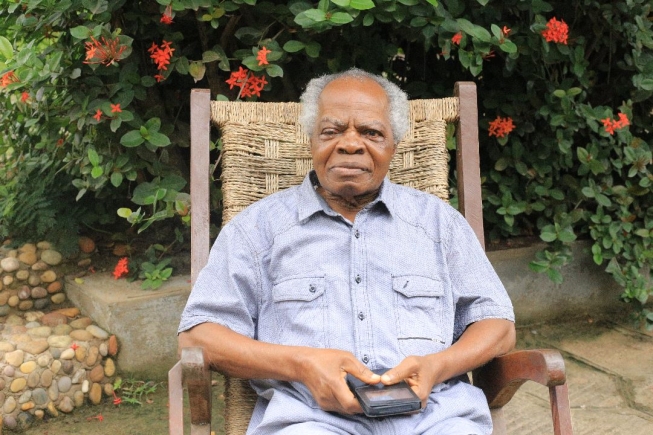A renowned botanist and ethnobotanical researcher, Daniel Abbiw, has renewed calls on national authorities to declare the Odum tree as Ghana’s national plant, describing it as a true symbol of the country’s character.
Odum, a timber species, has made profound contributions to Ghana’s physical and cultural heritage.
Known botanically as Milicia excelsa or Milicia regia, the Odum tree has historically been Ghana’s most important timber. It has been widely used in the construction of rest houses, guest houses, public buildings, furniture, vehicles, and homes. Its resilience, termite resistance and fire-proof qualities made it central to Ghana’s architectural identity.
“There is hardly a building from the early days of Ghana that didn’t use Odum,” Mr Abbiw explained. “Just as Britain honours the Oak (Quercus) as its national tree, Ghana should honour Odum,” he advocated.
The Odum is also traded internationally under the name Iroko.
Mr Abbiw, who turned 86 on September 3, 2025, and is now visually impaired, has spent the last decade campaigning for Odum’s recognition after decades of groundbreaking research, publications and national impact.
“This is not just about me,” he said. “It’s about acknowledging the very tree that helped build this nation. After 10 years and three governments, I am still waiting.”
Why Odum?
In his 2014 book Traditional and Religious Plants of West Africa, Mr Abbiw recommended Odum for national plant status due to its significant contribution to Ghana’s physical and cultural heritage.
Odum is classified as a Class 1a high forest tree, fully indigenous to Ghana. These classifications were detailed in his first major publication, Useful Plants of Ghana (1985), which continues to guide research and forestry education to this day.
Africa-wide plant heritage proposal
Beyond Ghana, Mr Abbiw has also proposed a continental initiative to promote national plant identities across Africa. Of the 55 African countries, only nine currently have declared national plants. In West Africa, only Ghana and Liberia have done so.
He has called on governments to select national plants and submit photos, names and botanical data for inclusion on a large African map of national plants. The map, he said, would also feature each country’s date of independence, currency, natural resources and population, and would serve as a landmark educational tool in both print and digital formats.
Still no action
Mr Abbiw recalled that he sent his first proposal to government in May 2015, but after receiving no response, he resubmitted it under a new administration. He said he even met President Nana Addo Dankwa Akufo-Addo in 2019, who promised to review the proposal, but no action was taken.
In 2021, he redirected his communication to the Chief of Staff, sending letters, a copy of his book and supporting documentation, but again received no confirmation or progress. The only official response came after a second letter sent around his 85th birthday in 2024, which was referred to the Ministry of Lands and Natural Resources and then to the Forestry Department.
“The official asked me whether Odum was a forest tree or savannah, and whether it was indigenous. These are matters I published 35 years ago. It was insulting,” he said.
He attributed the inertia to a lack of institutional memory and appreciation of academic research. Although the department ordered new copies of his book, no follow-up was made.
Recognition long overdue
On his 86th birthday, Mr Abbiw appealed for official recognition of Odum as Ghana’s national plant, to be enshrined in public records and national documentation. He also requested modest personal recognition for his lifelong service to the country, including accommodation for his retirement years and a service vehicle bearing the inscription “National Plant Award,” with fuel and maintenance support.
Legacy in waiting
He contrasted his situation with other national contributors: “My own tutor, Philip Gbeho, was honoured for composing the national anthem, £1,000 per minute. The late Theodosia Okoh, who designed our national flag, was rewarded instantly. And I? Ten years later, not even a pesewa, with a hole in it,” he lamented.
As a pioneering ethnobotanist whose research continues to inform ecological, conservation and cultural practices across West Africa, Mr Abbiw’s legacy is undeniable. Yet he remains without recognition for a contribution that dates back to 1985, when he first identified Odum as a potential national symbol.
“It is painful,” he said, “to have lived through three governments, written countless letters, appeared in the media, and still be ignored.”
“But I believe in Ghana. I believe we can still do what’s right before it’s too late,” he added.
About Daniel Abbiw
Daniel Abbiw is the author of Traditional and Religious Plants of West Africa and Useful Plants of Ghana. His work is internationally recognised and widely cited in global botanical and ethnographic circles. His 86th birthday fell on September 3, 2025. Due to visual impairment, this article was compiled from his spoken words.

